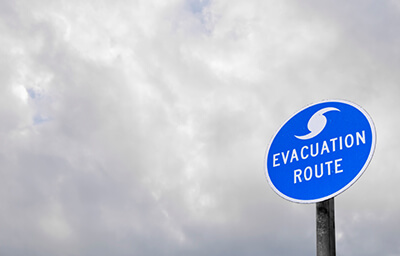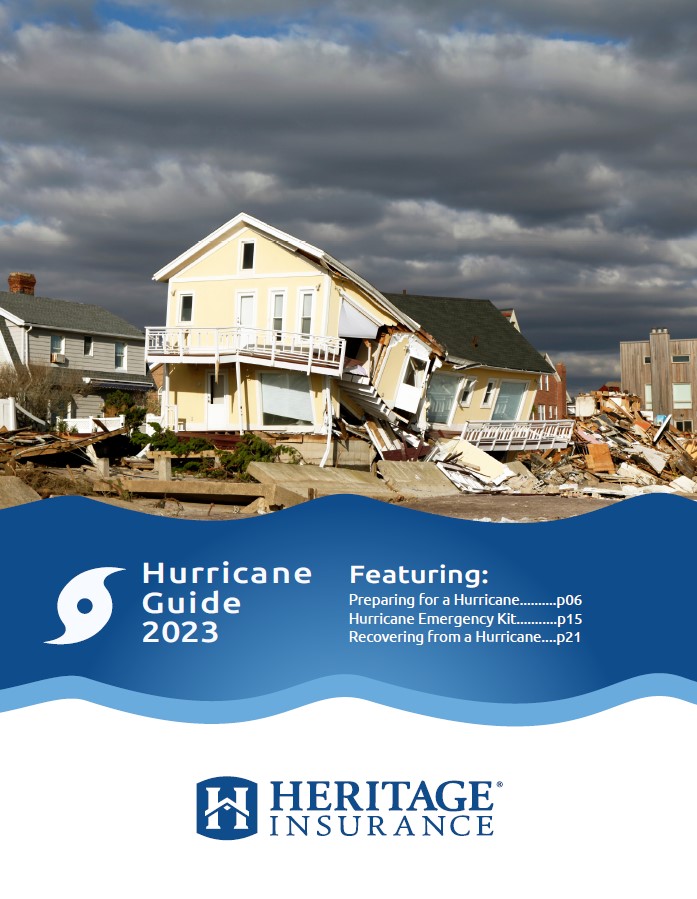Start Preparing Now

The eastern United States has been in a cycle of increased hurricane activity since 1995, a cycle that could continue another 25 years. We’re in a very active hurricane season and this might be the year you experience a direct impact.
In an area prone to hurricanes, it’s critical for every family member to have a clear understanding of what to do before and after the storm. Use this guide to develop a plan and make sure you have the right supplies this hurricane season.
Hurricanes cause a lot of rainfall, and tornadoes spin off of hurricanes as well. Hurricanes can leave thousands of residents without power or water for days and sometimes weeks. In the event of an evacuation, it can take up to 72 hours before emergency crews are able to enter affected communities.
In addition to the storm itself, there are three hurricane threats to deal with: hurricane-force winds, flooding and tornadoes. People inland need to be prepared with a hurricane plan just as if they lived along the coast. Hurricane preparation is one of the most important precautionary measures you can take to protect your home and family.
Here are some tips and tools that will help you before, during, and after a hurricane. Download the 2023 Heritage Hurricane guide for all the information you need before and after the storm.
Review Your Policy
Not having enough coverage can be just as traumatic as experiencing damage to your home and personal belongings. Take a few minutes to review your policy and make sure you have enough coverage.
- Choose the right hurricane deductible. Always make sure you have the funds set aside to cover the deductible you have chosen on your policy. If your home is damaged and you are unable to pay the deductible, it will prolong the recovery process.
- Review your personal property coverage. Throughout the years as you’ve purchased or sold items, have you updated the personal property coverage on your policy? It is important that the amount selected for this coverage is enough to repair or replace damaged items.
- Make sure your home has the right coverage to replace/repair your home.
- Consider flood insurance. Even if you don’t live in a Special Flood Hazard Area, a tropical storm can leave many homes devastated by floods.
Family Preparation
Fortunately, we usually have warnings before hurricanes and natural storms strike; but that doesn’t mean you should wait until the last minute to prepare. It’s important to have a natural disaster plan in place for your family before a storm hits.
Familiarize your family with the location of nearby emergency shelters and evacuation routes. In Florida, you can do this by visiting FloridaDisaster.org or through your local media. Review your homeowner’s insurance policy with your independent insurance agent to make sure you have adequate coverage for your home and personal property. Start to build a hurricane kit filled with the basics to help you and your family survive comfortably if you are temporarily without electricity or water during a storm. Don’t forget to include cash. Once the power goes out, so do the ATMs.
For the items you already have in your home, make sure they are in a safe place where you can easily retrieve them. The Great Hurricane Blowout website includes kit lists, or you can use our checklist below to start preparing today.
Protect Your Home
Homeowners can reduce the potential damage from hurricanes by implementing certain retrofit strategies. Here are a few suggestions to prepare your home for a hurricane or tropical storm.
Hurricane Shutters or Impact Resistant Glazing
Metal hurricane shutters are easily installed on most existing homes. In some designs, hurricane shutters can be electrically rolled down to protect the home. Storm-resistant shutters for a standard single-story home with 312 square feet of windows cost about $700. Don’t have the funds to purchase shutters for your windows and doors? Properly board your windows with plywood to prevent damage.
Impact-resistant windows are optimal for windows not easily fitted with hurricane shutters or those that are hard to reach. Make sure to install an impact resistant system on sliding glass doors because they are larger and more vulnerable to wind and debris than windows. If these doors cannot be replaced, then at the very least install hurricane shutters.
Strengthen Exterior Doors
Failure of the lock set, doorjamb or hinges frequently causes doors to blow in. The deadbolt should have a long throw (at least one inch) that should penetrate into the stud framing, not just the doorjamb. To strengthen the hinge side, ensure at least three hinges are properly installed with the hinge screws penetrating through the doorjamb into the studs.
Installing slide locks (also called head and foot bolts) at the top and bottom of door will further strengthen door. They are absolutely necessary for double doors. Ensure that the locks are mounted securely to the subfloor and door header, not just into the trim.
Reinforce garage doors
Reinforced garage doors protect the contents of the garage and the home. PATH recommends installing new, hurricane resistant garage doors. Retrofit kits are also available. These kits include horizontal and vertical bracing to strengthen the door. However, the bracing increases the weight of the door, which may force you to also reinforce the hinges or opening mechanism.
Don’t forget to bring all of your loose items inside. Keep your trees and shrubbery trimmed and make sure your gutters are clean to prevent flooding. Does your roof need to be repaired? A single loose or damaged shingle can cause severe wind damage to your home. You may want to contact a licensed and insured roofer to come in and provide you with an inspection.
After the Storm
While hurricane preparation is key, it is also important to understand what you should do post-hurricane so you can begin the rebuilding process quickly.
- Stay inside and do not drive. There may be damaged roadways, extended rainfall, and tornadoes.
- Look outside for downed or dangling power lines to report to your power company.
- Watch for loose animals in your community.
- Avoid tap water until you are sure it is safe.
- Open cabinets carefully. Items can fall off the shelves.
- Throw away spoiled food. If you are unsure, throw it away.
If you find there are damages to your home, notify your insurance agent of damage as soon as possible to start the claim filing process. Make temporary repairs in order to help avoid further damage, such as placing tarps on damaged roofs or boarding up broken windows. Hire only licensed, reputable repair companies and be sure to keep receipts for all repairs to provide to your claims adjuster. Be sure to take photos or video of damage prior to cleanup. If possible, do not throw away damaged items until the claims adjuster has reviewed them. Have your household inventory available for the claims adjuster, complete with photos/videos, receipts, and important information such as make and model numbers.
Be Prepared
Your area may not have been hit with a hurricane since Hurricane Wilma in 2005 and may be overdue for a hurricane or tropical storm. Whether it happens this year or in the coming years, it is vital to be prepared that this could be the year. Make sure that you start a hurricane kit for you and your family before a storm hits. Protect your home by buying hurricane shutters and strengthening your doors. When the storm is over, be cautious heading outside due to possible extreme conditions. If there’s damage done to your home in a hurricane and tropical storm, contact your agent right away to get started with the claims process. Also, don’t forget to review your policy with your agent to make sure you have adequate coverage for your home.
Heritage Insurance is committed to providing excellent coverage for your needs. If you have any questions about your policy, contact your insurance agent. They can help you understand your coverage and adjust your limits and deductibles as needed. Once a storm is headed our way, you will be unable to make last minute changes to your policy. If necessary, your agent might refer you to a friendly professional at Heritage for further assistance. From a small problem to a major disaster, Heritage Insurance is here to help you.







